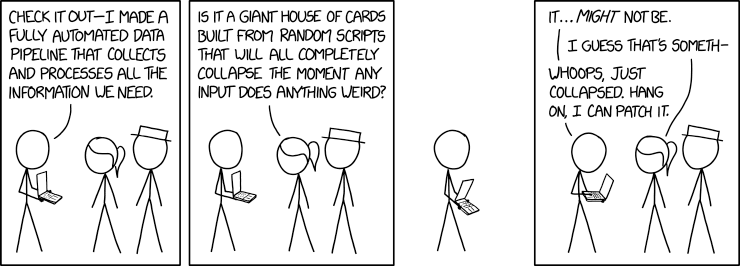---
tags: BMMB554-23
---
> Introduction to Data Driven Life Sciences | Spring 2025
# Syllabus
[](https://xkcd.com/2054/)
## Place and Time
[005 Life Sciences](https://www.map.psu.edu/?id=1134#!ce/30540?ct/59509,33177,25403,26748,26749,26750,27255?m/357017?s/) | Tuesday, Thursday [10:35am - 11:50am EST](https://www.timeanddate.com/)
:::success
The class is **in person** only. However, for those who are located in Hershey or unable to attend a particular lecture<sup>1</sup> a [**Zoom**](https://psu.zoom.us/j/94723019187) link is provided.
:::
> <sup>1</sup>**Notify** the instructor in advance if you are unable to attend a lecture for whatever reason.
## Instructor
**Anton Nekrutenko**
[aun1@psu.edu](mailto:aun1@psu.edu?Subject=BMMB554)
Wartik 505
Office hours by appointment only
:::warning
When contacting instructor use the above e-mail and include "BMMB554" in the subject line (simply click on [e-mail](mailto:aun1@psu.edu?Subject=BMMB554) address. It will invoke an email client with subject line pre-filled).
:::
## Course logistics
This course **does not use** Canvas. Canvas is a convoluted system with too many features and undefined purpose. Instead, this course is served from [GitHub](https://github.com/nekrut/BMMB554).
:::danger
**Do not contact me through Canvas!** I will not check my Inbox there. Instead, contact me via [email](mailto:aun1@psu.edu?Subject=BMMB554) as described above.
:::
## Grading and quizzes
:::warning
Each Tuesday class will start with a 10 min quiz. The quiz will be based on reading assignments from the previous week. Each quiz will be scored on `[0;100]` scale. Aggregate of quiz scores will represent 33.3% of the final grade.
:::
Attendance (33.3%) + Quizzes (33.3%) + Final Project (33.3%) ≈ 100%
## Lectures
The will be divided into several blocks:
1. Fundamentals of data science (2 - 14)
2. Datatypes and major analyses in modern biology (15 - 17)
3. Specific applications (18 - 27)
:::info
:grey_exclamation: Links to individual lectures are [here](https://hackmd.io/clsJ3WV2TfGzC6SgNkQJMA)
:::
----
- [Lecture 1](/kwGlqDuxTkWt26k_gbZwkg) - Introduction and History
- [Lecture 2](/Uv8ViAU_Qz-sQfnMAzzdlw) - Shell I
- [Lecture 3](/Z0IASJrEQMmx1TVWJQQpWg) - Shell II
- [Lecture 4](/RoCggQXDQym63EWWfBTFdg) - Intermission + History of Sequencing
- [Lecture 5](/yCKJF06ZTLu0cC5DXOqN7Q) - Python 1 - Variables, expressions, statements, functions
- [Lecture 6](/wUAhPm_bS6C1jI_eam90bg) - Python 2 - Strings and lists and FASTQ
- [Lecture 7](/0HnCf1n4SdijjIFNMoyI9g) - Python 3 - A more careful look at lists and dictionaries
- [Lecture 8](/yObWgcHBTXCuJDebqdarjg) - Python 4 - Recap of what we learned so far
- [Lecture 9](/KqlQyQolTEuMLwoqcf3dAg) - Python 5 - Processing files
- [Lecture 10](/BAAoS2DiRIaBPOJIzb_NDw) - Pandas 1 - Basic functionality
- [Lecture 11](/Y3R5DN4kSqulYXfX2Jcd1g) - Pandas 2 - Aggregation, sorting, merging]
- [Lecture 12](/V5HgMJnfTCuHbasCEDaSRw) - Python 6 - Making graphics programmatically
- [Lecture 13](/qeVCFCE9Sbi4HqNOZ5d0XQ) - Git/GitHub 1 - Git logic
- [Lecture 14](/AMlx1SzOSVm0rmcxIdxXyg) - GitHub/Git 2 - GitHub magic
- Lecture 15 - Guest Lecture by Kaivan Kamali - Introduction to AI
- [Lecture 16](/aGnxAmAcTxeqE7QOVH8Z1w) - Illumina sequencing
- [Lecture 17](/OXAX8FKAQ8y9PEGTwKmiGw) - Oxford Nanopore
- Lecture 18 - Class assessment for group projects
- [Lecture 19](/wKpZx2RrTVSLFhYpBIln8w) - Pacific Biosciences (PacBio)
- [Lecture 20](/W7MyVty1Rje0SiVdG1IOpw) - Introduction to Galaxy
- [Lecture 21](/z8lvMoTKRQ265YeSLGneqw) - Assembly I --- *k*-mers and graphs
- [Lecture 22](/uJ1F1uClQv64_KdgWTSMVw) - Assembly II --- Assembly from long reads
- [Lecture 23](/qmOIFJ24Q0mH11JbdlkPBg) - Assembly, Projects and what's next
- [Lecture 24](/GJpVkrjCQFap9nq2uQRTlg) - Sequence alignment
- [Lecture 25](/XFwf1Ds4Qemot_2ZrFYJbw) - Finding matches quickly
- [Lecture 26](/sRZaFyAsQq-HbeHl5u0YLg) - Variant calling in microbes + Key features of Galaxy collections
- [Lecture 27](/6YF5HNrPT6G6KMgG0QPptA) - What is transcriptomics?
-----
- [Projects](https://hackmd.io/pWlFb2KKQyGeEiuM5VHT6w) - description of class projects
## ECoS Teaching Statement
><tt>In an examination setting, unless the instructor gives explicit prior instructions to the contrary, violations of academic integrity shall consist of any attempt to receive assistance from written or printed aids, from any person or papers or electronic devices, or of any attempt to give assistance, whether the student doing so has completed his or her own work or not. Other violations include, but are not limited to, any attempt to gain an unfair advantage in regard to an examination, such as tampering with a graded exam or claiming another's work to be one's own. Other assessments (including ANGEL-administered quizzes and assessments as well as homework assignments) are expected to represent your own independent work unless specifically stated otherwise. Failure to comply will lead to sanctions against the student in accordance with the Policy on Academic Integrity in the Eberly College of Science. [The Eberly College of Science Code of Mutual Respect and Cooperation](www.science.psu.edu/climate/Code-of-Mutual-Respect-final.pdf) embodies the values that we hope our faculty, staff, and students possess and will endorse to make The Eberly College of Science a place where every individual feels respected and valued, as well as challenged and rewarded. The Eberly College of Science is committed to the academic success of students enrolled in the College's courses and undergraduate programs. When in need of help, students can utilize various College and University wide [resources for learning assistance](http://www.science.psu.edu/advising/success). Penn State welcomes students with disabilities into the University's educational programs. If you have a disability-related need for reasonable academic adjustments in this course, contact the Office for Disability Services (ODS) at 814-863-1807 (V/TTY). For further information regarding ODS, please visit the Office for [Disability Services Web site](http://equity.psu.edu/ods/). In order to receive consideration for course accommodations, you must contact ODS and provide documentation (see the [documentation guidelines](http://equity.psu.edu/student-disability-resources/guidelines)). If the documentation supports the need for academic adjustments, ODS will provide a letter identifying appropriate academic adjustments. Please share this letter and discuss the adjustments with your instructor as early in the course as possible. You must contact ODS and request academic adjustment letters at the beginning of each semester.</tt>